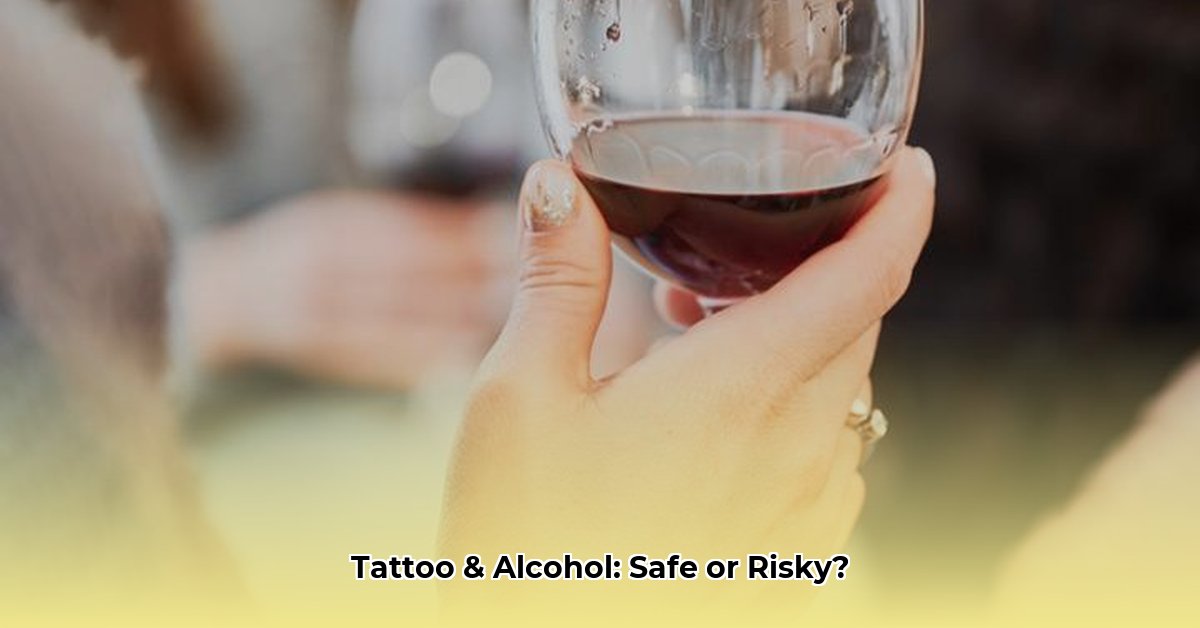Don’t.
You’re probably buzzing with excitement about your fresh ink, maybe even thinking about celebrating with a drink or two. But before you reach for that celebratory beverage, let’s talk about why mixing alcohol and a new tattoo is a really bad idea. Think of your new tattoo like a wound (because it is). Alcohol interferes with your body’s ability to heal properly, meaning your awesome new art could end up looking… not so awesome.
Why Alcohol and Fresh Ink Are a Recipe for Disaster
Let’s debunk the myth that “just one drink won’t hurt.” Even a small amount of alcohol can negatively impact your tattoo’s healing process. Here’s the breakdown:
- Blood Thinning: Alcohol interferes with platelet function. Platelets are essential for clotting, which stops bleeding. Thinner blood means more bleeding, which can wash out freshly deposited ink and lead to a faded, patchy tattoo.
- Impaired Healing: Alcohol suppresses your immune system, making you more susceptible to infections. An infected tattoo isn’t just painful and unsightly; it can also lead to serious health complications.
- Dehydration: Alcohol’s diuretic effect dehydrates your skin. Dry, flaky skin can pull out ink as it heals, distort the design, and even lead to scarring.
The Science Behind “Just Say No”
Research suggests that alcohol’s impact on healing goes beyond just these three factors. Some studies indicate that alcohol can also:
- Increase Inflammation: Inflammation is a natural part of the healing process, but excessive inflammation, potentially exacerbated by alcohol, can hinder proper healing and increase the risk of scarring.
- Disrupt Collagen Synthesis: Collagen is crucial for skin repair and elasticity. Some evidence suggests that alcohol may interfere with collagen production, potentially affecting the long-term quality of your tattoo.
How Long Should You Steer Clear?
The absolute minimum is 48 hours. However, for optimal healing and the most vibrant results, experts recommend abstaining for a full two weeks, possibly longer for larger pieces. While it may seem like a long time, consider it an investment in your body art’s longevity.
Before and After: Essential Tips
- Pre-Tattoo Prep: Avoid alcohol for at least 24 hours before your appointment to optimize blood clotting and immune function. Consider managing pre-tattoo jitters with deep breathing exercises or discussing numbing cream with your artist.
- Post-Tattoo Slip-Up: If you’ve already had a drink, increase your water intake, be extra diligent with cleaning and moisturizing, and monitor for infection signs. Contact your doctor if you notice anything concerning.
- Aftercare Essentials: Gently cleanse, moisturize regularly, avoid picking or scratching, and shield your tattoo from the sun.
Addressing Other Concerns
- Type of Alcohol: The type doesn’t matter; all alcoholic beverages can negatively affect healing.
- Drinking Before: Avoid alcohol for at least 24 hours pre-tattoo to minimize bleeding during the procedure and ensure optimal ink settling.
- Long-Term Effects: While occasional drinks after full healing likely won’t cause significant issues, consistent heavy drinking can dehydrate skin and dull ink over time.
FAQ
- Can I have just one beer? No. Even small amounts can hinder healing.
- What about wine or spirits? The type doesn’t matter; any alcohol can have negative effects.
- How long after can I exercise? Check with your tattoo artist, but generally wait at least 48 hours to avoid excessive sweating and friction.
The Takeaway
Your new tattoo is an investment. Treat it with respect. Skip the alcohol, follow proper aftercare, and enjoy a vibrant, beautifully healed tattoo for years to come. While current research provides strong evidence for abstaining from alcohol, ongoing studies continue to explore the nuanced relationship between alcohol and tattoo healing. Stay informed and follow your artist’s advice for the best results.
- Divided Food Storage Containers Transform Meal Prep and Portion Control - February 8, 2026
- Divided Food Containers Are Meal Preps Secret Weapon - February 7, 2026
- Food Kits for Adults Offer Fun DIY Cooking Adventures - February 6, 2026










